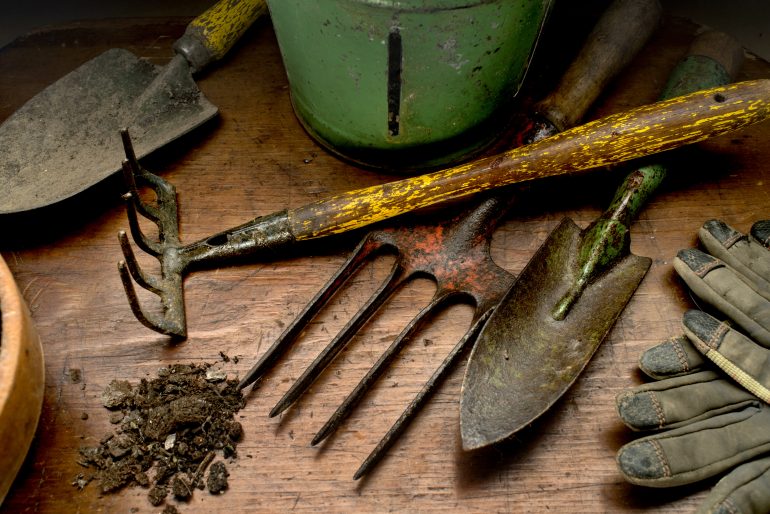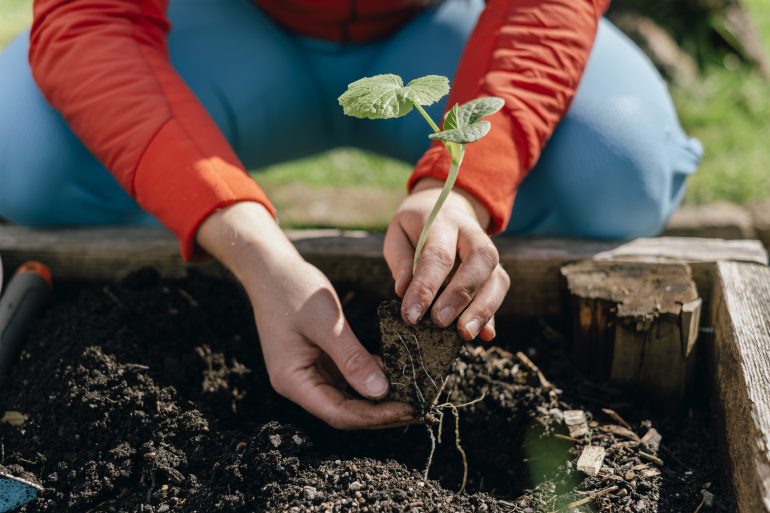While it’s technically still winter, February somehow feels like a turning point for your garden. It’s still cold outside so you’ll need a woolly hat and a thick jumper but take a look around and you’ll see the green shoots of spring emerging everywhere.
The first flowers of spring are starting to poke their heads above the soil, the days are getting a little longer and if you’re very lucky, you’ll have the odd sunny day!
However when it comes to making a list of things to do in the garden in February, exercise a little caution. While the occasional bright day is more than welcome, the second month of the year can also bring bitter cold, rain, hard frost and even snow.
But whatever the weather, there are still lots of gardening jobs to do in February. Let’s take a look at some of the most important.
General Garden Maintenance

Garden tools (Photo: ATU Images via Getty Images)
Some of the most important gardening jobs to do in February don’t involve any gardening at all but there are plenty of things you can do to get your garden prepared for planting.
Tools
If you didn’t do it in January, it’s a good idea to make sure your tools are ready for your February garden tasks. Sharpen up your shears, secateurs and hoes and oil any that may have seized up over the cold winter. If you use power tools, consider getting them serviced and check the wires haven’t been nibbled by unwanted visitors.
Plant Care
If the snow does fall, make sure you brush it off your hedges, shrubs and trees to stop branches breaking under the weight. Some plants may have come loose due to the frost so take a walk around the garden and firm them back down. You can now spread compost and well-rotted manure over your soil, and turn it to get it prepared for planting later in the month. About two weeks before planting, you may want to cover the soil with plastic sheeting to warm it up.
Bird Feeders and Nesting Boxes
This is one of the gardening jobs for February that doesn’t require much gardening at all. Keep your bird feeders topped up with fat balls, seed and nuts and ensure a steady supply of water.
Plants

Planting (Photo: Alex Ratson via Getty Images)
This is one of the February garden tasks you’ve been waiting for since winter started. You can now start to plant flowers and vegetables.
Vegetables
Jobs for the garden in February can be split into things that can be done early in the month and things that can be done towards the end of the month. You can start sprouting – or chitting – your potatoes (laying them in egg boxes or seed trays in a cool place) ready for planting within a month. You can also start sowing seeds like herbs, cabbage, lettuce, tomatoes and onions indoors. In cold frames outdoors, you can start to sow early carrot varieties, parsnips and broad beans as well as kale which can usually withstand a hard frost.
Flowers
There are lots of gardening jobs to do in February where flowers are concerned. If you have any winter flowering shrubs such as jasmine or heather, prune them back after they have finished flowering. You should also prune any climbing plants and dormant rhododendrons and cut back shrubs. If you have any ornamental grasses, cut back the old foliage before the new growth spurt starts. If you’re into container gardening, there are loads of beautifully bright flowers you can plant that will start to flower within weeks, such as pansies, primroses, hyacinths and of course the spring favourite, daffodils.
Your Lawn
When we think of gardening the lawn is often overlooked but grass care is one of the vital jobs for the garden in February. Now is the time to sow your lawn seed, but keep a watchful eye out for weeds and get rid of them before you sow the seed. It’s also a good idea to remove worm casts – the small heaps of curly organic matter expelled by earthworms – using a hard broom or a rake.












